Sheffield Doc/Fest 10: THE EYES OF ORSON WELLES: F For Fantastic (& Interview With Mark Cousins)
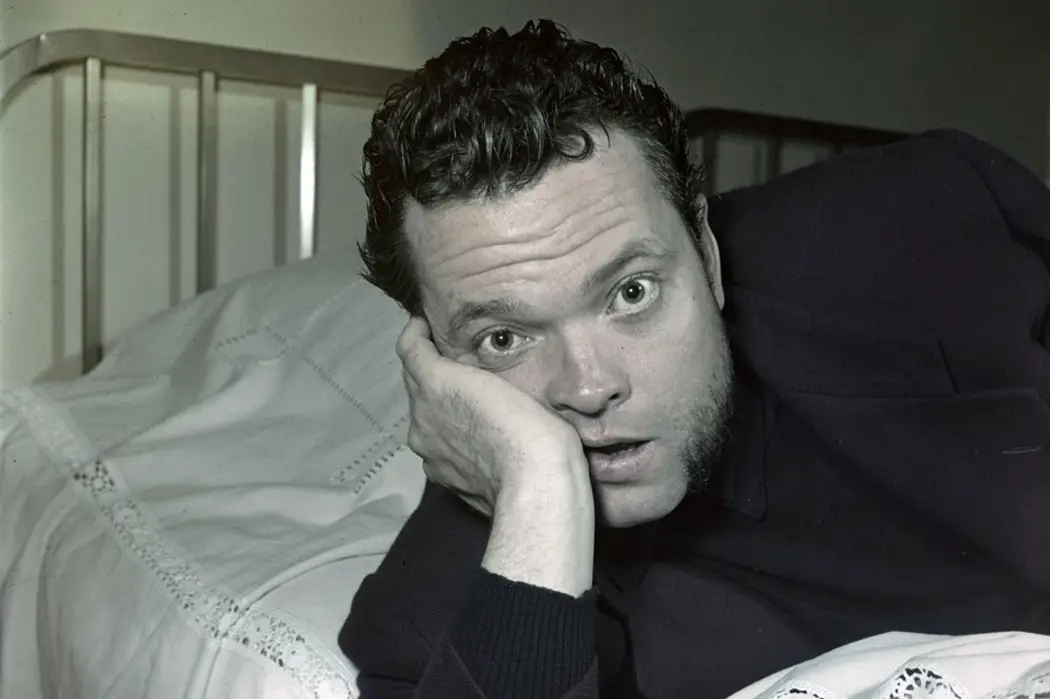
Musanna Ahmed is a freelance film critic writing for Film…
I preceded my interview with cineaste filmmaker Mark Cousins by telling him that this was the most positive film I had seen in a sea of depressing, downbeat picks at Sheffield. The Eyes of Orson Welles is an extremely engaging, highly entertaining and incredibly informative documentary on the acclaimed auteur’s work.
The Eyes of Orson Welles
Cousins’ framework is established by his unprecedented access into Welles’ vault of paintings and illustrations, with the assistance of the collections’ keeper Beatrice Welles, daughter of the famed filmmaker. It’s a previously unexplored treasure trove of material for Cousins to work with, who analyses the content and context of these visual works and relates them to Welles’ films. We learn how the filmmaker’s early visual work influenced his filmography – one such example is a penchant for drawing kings and other symbols of royalty which was then reflected in his strong desire to typically play regal figures.
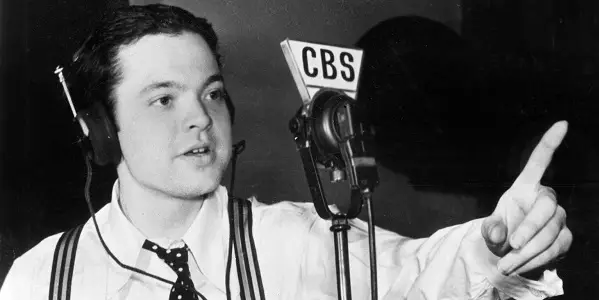
That makes The Eyes of Orson Welles sound like it resembles the film academia that’s only geared towards film students, but Cousins’ appealing method of avoiding precisely this is to turn a traditional second-person perspective voiceover into letters addressed towards Orson Welles. Sounding like the best pen-pal in the world, Cousins playfully talks to Mr Welles about his life and artistic choices, gleaning what he can through the wealth of material in front of him. His letters are marvelously written and often humorous – his high-spirited vocal delivery could be listened to for hours. There’s a point where Cousins conjures up a reply from Welles with the help of voice actor Jack Klaff, who does a terrific job, an uncanny imitator of the cinematic innovator.
Footage of the present-day world, shot by Cousins, is used as a reference point with a sly suggestion that the Citizen Kane-filmmaker’s art influenced the world in such a way, through architecture, media, and, indisputably, cinema. What makes Cousins’ approach so remarkable is that it’s largely subjective in his responses to the legendary filmmaker’s work, but at the same time we form our own interpretations of Welles along the way. Perhaps the most effective way in which Cousins achieves this is by repeatedly going back to a particular photo of the man. The image depicts a fairly young Orson laying on a bed and looking straight at the camera with his mouth agape and those big eyes widened. He looks like he’s half-posing and half caught off-guard. With each chapter, this image takes on a new meaning each time, unique to each audience member.
The Eyes of Orson Welles is such a joy for fans of the filmmaker, who’ll gain a deeper appreciation of much of his work including Touch of Evil and Macbeth, which is one of the most significantly dissected films here and in turn one of the more strongly connected ones to his original paintings. Those with less knowledge of Orson Welles will also find much to enjoy here, for Cousins’ terrifically entertaining style to storytelling is broadly accessible. We could trust Cousins to produce an excellent documentary on this filmmaker – or any other one – following the thoroughly enlightening series The Story of Film: An Odyssey. With The Eyes of Orson Welles, Mark Cousins claims his stake as the Ken Burns of documentaries on cinema history.
Interview with Mark Cousins
I met with Mark Cousins at the festival where he showed me a physical copy of one of the previously unreleased paintings. I shared with him my thoughts on The Eyes of Orson Welles, as reviewed above, of which many of my points turned into questions for him too.
Musanna Ahmed for Film Inquiry: I greatly enjoyed the film.
Mark Cousins: Thank you.
The majority of my film viewing here at this festival has been depressing, so this was a bundle of joy.
Mark Cousins: [laughs] Okay that’s very nice. It’s not your usual film in Sheffield.
Yeah, though I can see it being an audience favourite considering so many people turned out for it, even at 9am, and I’ve talked to people who loved it too.
Mark Cousins: Great!
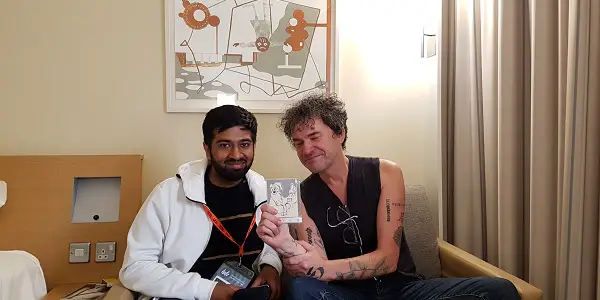
Onto the questions. There’s this image you keep coming back to of Orson Welles laying in the bed looking at the camera. What was it about that image that fascinated you?
Mark Cousins: Because it’s a letter, I wanted to choose one image to recur occasionally in the film. We’re used to seeing Orson Welles as an old gentleman with a big beard but we have to remember that he became famous in his youth. He was more famous in his twenties and thirties than at any other time, so we wanted the image to be of a young Orson. It had to be a ‘listening’ shot and the eyes are quite wide. The film is called The Eyes of Orson Welles and his eyes are beautiful in this particular image, I think it’s a very handsome shot.
The image is interesting to me because it takes on a new meaning between each chapter. Like how you see him as a king then you return to this image and it brings him back down to earth in a way.
Mark Cousins: That’s what I was hoping. The first chapter which is about social justice is him at his most admirable, we really like him in that part so the photo is perfect, whereas when we hear about his love life he’s less admirable – the photo looks more duplicitous then. We read something into a picture given what we know.
Indeed. You have access to such a treasure trove of material. Is there anything you would have liked to kept in the film but couldn’t?
Mark Cousins: We didn’t cut out very much. I tend to edit quite quickly with my editor Timo Langer so we’ve changed only 1 or 2% of the film since first cut. There are nearly a thousand Orson Welles drawings and paintings in the world but we had access to nearly all of them either through the ones owned by his daughter, or the ones in the University of Michigan and Indiana, both of which have got extensive collections, and all of which were made available to me. Since I was the first person to see a lot of this stuff in detail, I had to do a lot of reading of it. For example I decided, as you see, to look at the Christmas cards and to look at the iconic visual development within those Christmas cards. I loved that, it was like walking on virgin snow. Nobody has studied these Christmas cards and tried to work out what their meaning is so I loved the access.
With that level of access, you have the potential for the distribution of this film to have that component of an exhibition. Is that something being discussed?
Mark Cousins: How clever you are! Yes, we will be doing a big exhibition of nearly all the drawings and paintings I have at the Edinburgh Festival, the world’s biggest arts festival. You must come and see it.
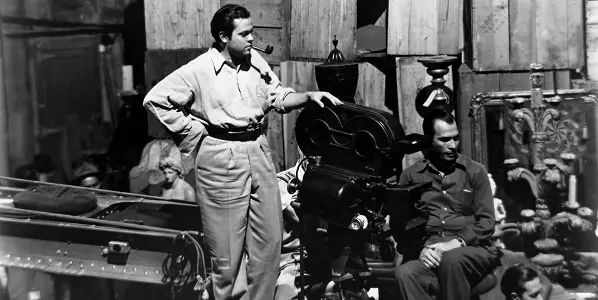
I would certainly love to see that. I also appreciated your film because it’s so beautifully written. How long did it take to write the film?
Mark Cousins: Thank you. I always write after the image, not before. I didn’t start with the script and go out to find the image that fit the words. I usually wrote between 8 in the morning and 9.30 then editor Timo came along and we edited what I’d written. I’m a slow reader and have problems with reading but I’ve always been interested in the cadence and the rhythm of prose and blank verse, especially blank verse. It’s not poetry but there’s something poetic about it. I decided, as you noticed, to not say “he did this” but rather “you did that”, directly addressed to Orson. The reason for that was because it was more intimate.
As well as being more intimate, I think you’ve made the film so accessible through the sheer entertaining style of your letters, so that opens up the enjoyment for audiences who aren’t necessarily film history buffs.
Mark Cousins: I hope so. I’ll be honest, I think this is a letter to a dead dad. To those of us who love cinema like you and me, Welles is a sort of father figure to all of us. When my own father died at age 56 I recited the eulogy and the first words were “Dear dad.” The first words of the film are “Dear Orson Welles.” I was dealing with his daughter so that’s her actual dad but he’s a sort of cinematic dad to the rest of us. That’s why I think the letters make it broader, as you say. You don’t have to be a massive movie buff, you just need to have admired somebody from the past and want to investigate them and like the idea of having this intimate conversation with them.
I’m curious to know, since you were the first person to access these images, why do you think that is?
Mark Cousins: That’s a good question and I believe a few of them have been published before but most of them haven’t been. It may be because they were in storage in New York and it’s only now that his daughter has decided to start selling stuff off. She’s only 60 but she’s starting to think “Okay, I can’t do this forever” so she’s starting to make this stuff available. In fact, all of the drawings and paintings in my film will be for sale at some point. Also, it was recently his 100th anniversary, plus his unfinished film The Other Side of the Wind is coming out, so maybe there’s a Welles moment happening right now. I don’t think we’ll ever get tired of Orson Welles. I’ve stayed away from the great white male American filmmakers in a lot of my work but he’s so contradictory, so modernist and extremely traditional. Admirable and not so admirable. All these wild contradictions are why I still care and am still interested.
These wild contradictions are further interesting because your film is so analytical so I’m wondering, based on the few screenings you’ve had so far, if anyone has had different interesting interpretations of his character to you?
Mark Cousins: Good question. It’s so early in the life of this film – I’ve played Cannes and then here – but when it comes out in the UK on 17th August I’ll go out on a tour and that’s when I’ll get these various reactions. People are surprised that there’s more to say about Orson Welles. Most people don’t know about the Officer X thing, the anti-racism, that social justice. For a lot of people that’s new and casts him in a new light because of his moral and political courage.
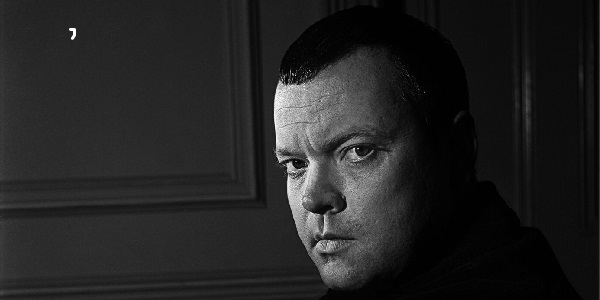
Right. Your film is quite dense with a lot of ground covered in your exploration of his life and career so I’m wondering if you have any intentions to continue your study of Orson Welles?
Mark Cousins: I don’t know what else I would have to say but I’ll always be in his imagination. I feel like I entered the imagination of Orson Welles when I first saw Touch of Evil as a kid and I’ve been in there ever since. It’s like a vast cathedral, you enter it and it’s echoey and full of light and shade and I love being in there. This time I went in through the back doors with the drawings and it’s a great feeling. Whether I would say or do any more on Orson Welles I can’t say at the moment but I also like to try new things so probably not.
You mentioned Touch of Evil. That’s my favourite Orson Welles film. What’s your favourite?
Mark Cousins: Touch of Evil… well it was Touch of Evil but then it became Chimes at Midnight and now I’m most fascinated by Macbeth. It was derided at the time and he pulled it from the Venice Film Festival. I came to believe through this film that he was primarily a visual thinker more than a political, moral or theatrical thinker and the most visual of all his films is Macbeth.
Going back to the previous answer about wanting to try new things – you’re establishing yourself as the Ken Burns of film history documentaries. Which filmmaker or movement of cinema is next to get the Mark Cousins treatment?
Mark Cousins: [laughs] Only some of my films are about films. My last one (Stockholm My Love) had nothing to do with film so I like to do other things as well as film docs. I’ve made a film about holocaust denial and the atomic age so I like jumping around in my subject matter. However I am making a very long film at the moment, a 16-hour film, and it’s about cinema (Women Making Film, which will premiere its first 4 hours at Venice Film Festival). I’ve been working on it for nearly ten years.
I’m very excited for it and hope many people see The Eyes of Orson Welles. That’s all my questions, thank you for speaking with me Mark.
Mark Cousins: Great, thank you so much too. It was a pleasure.
Film Inquiry would like to thank Mark Cousins for his time and insight.
The Eyes of Orson Welles will be released in UK cinemas and on VOD on the 17th August 2018. To see details of the screenings, including the Q&A tour with Mark Cousins, click here. For US audiences, Janus Films has acquired the film for a release in 2019. To see the release dates in other countries, click here.
Doc/Fest 10 is a series of combined review and interview features for ten films seen at the Sheffield International Documentary Festival 2018. You can view the rest of the features by clicking here.
Does content like this matter to you?
Become a Member and support film journalism. Unlock access to all of Film Inquiry`s great articles. Join a community of like-minded readers who are passionate about cinema - get access to our private members Network, give back to independent filmmakers, and more.
Musanna Ahmed is a freelance film critic writing for Film Inquiry, The Movie Waffler and The Upcoming. His taste in film knows no boundaries.













